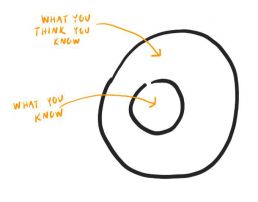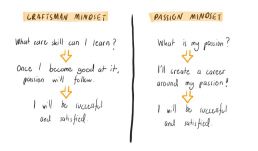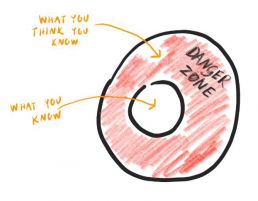“You have to figure out what your own aptitudes are. If you play games where other people have the aptitudes and you don’t, you’re going to lose. And that’s as close to certain as any prediction that you can make. You have to figure out where you’ve got an edge. And you’ve got to play within your own Circle of Competence.”
– Charlie Munger
What is a circle of competence?
Simply put, a circle of competence refers to the areas which match a person’s skills or expertise.

Many argue that the key to success in any aspect of life is to find your circle of competence and to only operate within that circle.
For instance, many investors believe that it is best to only invest in stocks that are in fields that you understand. This concept was introduced in Berkshire Hathaway 1996 Shareholder Letter by Warren Buffett:
What an investor needs is the ability to correctly evaluate selected businesses. Note that word ”selected”: You don’t have to be an expert on every company, or even many. You only have to be able to evaluate companies within your circle of competence. The size of that circle is not very important; knowing its boundaries, however, is vital.
Notably, the size of the circle doesn’t really matter. But knowing the limits of your circle is vital.
Moreover, the concept doesn’t necessarily mean that you should become hyperfocused and highly specialized. You can always expand your circle of competence to other areas, as long as you’re aware of the limits of your circle (and the fact that it will take a long time to become competent in a new area).
Why is it beneficial to focus on your circle of competence?
- Your decision-making is more efficient and you save time, as you’re able to eliminate bad decisions quicker.
- Similarly, you make fewer mistakes.
- You are able to formulate more solutions to problems as you can more easily see all the variables at play.
- Operating within your circle often leads to the most amount of satisfaction, as it’s easy to enjoy things you’re good at (see Cal Newport’s ‘Craftsman Mindset’)

What’s the downside of focusing on your circle of competence?
The way I see it, focusing on a circle of competence can also be harmful, especially if your circle of competence is really small.
As many mental models (like the map-territory relation and relativity) suggest, you can never really see the whole truth. However, you can get closer to the truth by looking at the problem from multiple perspectives.
So if your circle of competence is really small, you only have one or two perspectives you can use to solve problems. And that could become an issue.
Let’s say you’ve worked in the pharmaceutical industry for 20 years and you know the ins and outs of that industry. So, naturally, you feel competent in pharmaceutical stocks, and you’ve decided to only invest in those. So far so good.
However, the pharmaceutical industry is not immune to changes in other industries. For instance, if you’re like me and have no understanding of politics or law, you can’t really understand how a drug is approved for public use, which in turn makes it really hard to evaluate pharmaceutical companies.
Creating and maintaining a circle of competence
Creating a circle of competence boils down to a three-step process:
1) Be curious and eager to learn more. Seek out information that can help you expand and strengthen your circle.
2) Monitor your track record. Observe how your knowledge translates into actions and results. Reflect on the results and learn from them.
3) Gather honest feedback. Basing your circle solely on your own observations can be misleading. An outside perspective helps you see the limits of your circle more clearly.
You should also remember that building a circle of competence is not a one-time job, it’s a constant process. You don’t build it once and let it be – you learn, monitor, and gather feedback over and over again to expand and maintain your competence.

It’s also vital to understand that you’ll frequently find yourself operating outside your circle of competence. When this happens, you could acknowledge your lack of expertise and steer yourself back to your own circle OR you could follow a three-step process to grasp the essence of this “new circle”:
1) Gather at least the basic knowledge of the topic.
2) Ask questions from people who have a strong circle of competence in the area.
3) Use other mental models to augment your lack of knowledge and to fill gaps.
Fooled by foolishness
So it seems that the problem is not that we sometimes operate outside of our circle of competence, but that we have a hard time acknowledging when we do.
We are often too keen to voice our opinions in situations where we are clearly outside of our own circle (I’m no exception). Our own incompetence fools us: we know so little that we don’t even know how little we know (also called the Dunning-Kruger effect)!

So when we do operate outside of our circle, instead of arguing about things we don’t really understand, we should instead avoid mistakes and ’tread lightly’. “The Loser’s Game”, a concept that originates from the world of sports, illustrates this:
When professional tennis players play a game of tennis, they rally back and forth until one player hits the ball just beyond the reach of his opponent. In other words, until the other player wins a point.
When amateur tennis players play a game of tennis, they rally back and forth until one player hits the ball into nets or out of bounds. In other words, until the other player loses a point.
So if you’re an amateur (i.e. you’re outside of your circle of competence), your main focus should be on avoiding mistakes.
That’s why it is so important to know the limits of your circle of competence. As harsh as it may sound, our opinions often don’t carry that much weight outside of our circle of competence. So why spend time outside your circle?
Focus on your competencies – that’s where you can provide the most value and where you can reap the greatest benefits.
More?
Look no further! Here are a few carefully selected blog posts for you.
The Unlazy Letter
Probably the most irregular and wackiest newsletter out there. Give it a shot?

Hello sir.. Big fan!! Thanx for all the knowledge u provide for our cromagnon minds..I really appreciate..do remember u always have as a friend in any need of urs..thanks for reading..keep going unlazy
Thanks, glad you enjoy the content!
Hi Jonne, just wanted to say I love what you’re doing and feel you are more unique, genuine and funny than any other Youtube channel out there. Keep up the good work!
Wow, thanks a lot Milo🤗